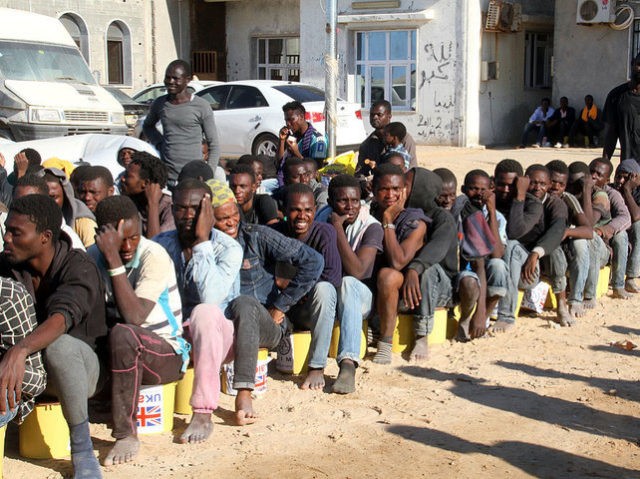A 24-year-old Nigerian shared his ordeal as one of the thousands of West Africans who have traveled to Libya where their traffickers forced them into “a grim and violent world of slave markets, private prisons, and brutal forced brothels,” reports the Guardian.
“They took people and put them in the street, under a sign that said ‘for sale,’” reportedly said 27-year-old Shamsuddin Jibril, another survivor from Cameroon who twice saw men traded publicly in the streets of the central Libyan town of Sabha.
“They tied their hands just like in the former slave trade, and they drove them here in the back of a Toyota Hilux. There were maybe five or seven of them,” added Jibril.
Many African migrants pay traffickers to travel to Libya in search of employment there or hoping to sail to Europe.
The Guardian notes:
Migrants who managed to reach Europe from Libya have long told of being kidnapped by smugglers, who would then torture them to extort cash as they waited for boats. But in recent years this abuse has developed into a modern-day slave trade – plied along routes once used by slaving caravans – that has engulfed tens of thousands of lives.
The new slave traders operate with such impunity that, survivors say, some victims are being sold in public markets. Most, however, see their lives and liberty auctioned off in private.
This year, the United Nations agency known as the International Organization for Migration (IOM) confirmed that African migrants are being bought and auctioned off at public “slave market” in Libya.
Citing the IOM, the Libyan Express notes:
Hundreds of migrants along North African migration routes are being bought and sold openly in modern day “slave markets” in Libya, survivors have told the United Nations migration agency, which warned that these reports “can be added to a long list of outrages” in the country. The International Criminal Court is now considering investigating.
Muhammed Yusuf, the 24-year-old Nigerian who shared his ordeal, faced the trafficker who sold him off six months ago to people who tortured him. He reportedly witnessed his friend’s death.
The Guardian points out:
Unembarrassed and unrepentant, the smuggler [who sold him off] was still touting for business among the crowds flooding into Agadez, an oasis town on the fringe of the Sahara desert in central Niger that has for centuries been a trading center and gateway to shifting paths across the desert.
“I told him ‘my friend died in Libya because of you,’” Yusuf said, referring to his former captor and adding that hunger forced him to ask the trafficker for food.
“The man shrugged off both appeals, and walked away, saying only: ‘I am sorry, but God will help you,'” reports the Guardian.
In April, IOM revealed that hundreds of Africans had been victims of slave markets and other atrocities in Libya.
Since the U.S.-backed removal and subsequent execution of the autocratic Libyan leader Muammar Gaddafi in 2011, the vast, sparsely populated nation has been gripped by political chaos and violent groups competing for power, making migrants passing through vulnerable to exploitation.
“Sub-Saharan migrants were being sold and bought by Libyans, with the support of Ghanaians and Nigerians who work for them,” reports staff from the branch of the U.N.’s IOM in Niger, which is helping victims return home.
“The situation is dire,” declared Mohammed Abdiker, the IOM director of operation and emergencies, who recently visited the Libyan capital, Tripoli. “The more IOM engages inside Libya, the more we learn that it is a vale of tears for many migrants. Some reports are truly horrifying and the latest reports of ‘slave markets’ for migrants can be added to a long list of outrages.”
The hazards faced by migrants attempting to cross the Mediterranean to Europe in overcrowded, unsafe vessels have been well documented.
However, the dangers the West African migrants fleeing poverty encounter in Libya are less well-known.

COMMENTS
Please let us know if you're having issues with commenting.